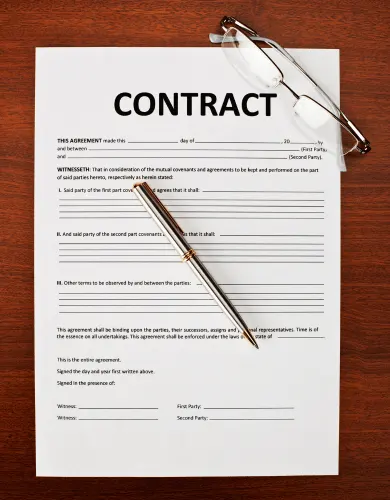Business Broadband Speed Guide
Choosing the speed of your next business broadband package requires a fine balance. A slow connection can cause significant productivity issues, while a package that is too fast may be unnecessarily expensive.
This guide aims to provide you with all the information you need to choose the right broadband speed for your business. Here’s what we cover:
- Business broadband speed calculator
- What determines my business broadband speed?
- Benefits of faster broadband speeds for your business
- Business broadband speed test
- Recommended business broadband speeds
- Optimising business broadband performance
Business broadband speed calculator
Our business broadband speed calculator estimates the minimum speed requirement for your business from a few simple questions about how your business uses the internet. We’ll also recommend a connection type that supports the speed your business requires.
What determines my business broadband speed?
Here, we summarise the four main factors determining the broadband speed your business broadband users receive.
Connection type
The technology used to connect your business to the internet is the biggest determinant of the broadband speed your business receives.
The table below shows all the business broadband connection types available in Britain, including their top speeds and availability.
| Connection Type | Top Performance | Availability |
|---|---|---|
| ADSL Broadband | Up to 20 Mbps | Near universal |
| 5G Business Broadband | Up to 150 Mbps (variable!) | Most towns and cities |
| Satelitte Business Broadband | Up to 200 Mbps | Universal |
| SoGEA Business Broadband | Up to 80 Mbps | 97% of UK properties |
| Cable Broadband | Up to 1,000 Mbps | 60% of UK properties |
| Full Fibre Broadband | Up to 1,000 Mbps | 70% of UK properties |
| Leased Line Broadband | Up to 10,000 Mbps | Majority of the UK |
Your business broadband package
Business broadband deals are typically advertised with a range of speeds, with the monthly business broadband costs increasing with the chosen speed.
Often, the simplest way to get more speed is to upgrade your current broadband package to a higher speed tier.
💡Ofcom has published a broadband speed advertisement code of practice that requires providers to give accurate information about expected broadband speeds. However, only BT, TalkTalk, and Virgin Media Business Broadband have signed up to this.
Number of users
The speed offered by your broadband connection is shared among all connected devices.
The more active users you have connected to your broadband, the slower the speed each user will receive.
💡Most routers come equipped with QoS (Quality of Service) that prioritises activities like VoIP calls, which require a minimum speed to guarantee quality.
Network congestion
Business broadband providers must manage network congestion during peak times when too many users overload their infrastructure.
Broadband providers use throttling to reduce speed availability to manage network congestion.
Business broadband deals are typically more expensive because providers prioritise business traffic over domestic traffic during network congestion.
Benefits of faster business broadband speeds
Here are the three principal benefits of a fast and reliable business broadband connection:
- Productivity – Most businesses now rely on cloud-based services for storage, workplace, and project management software. Reliable high-speed internet guarantees access to these tools.
- Communication – The PSTN switch-off is moving companies to digital business phone lines. Reliable high-speed broadband is crucial for virtual meetings and client communications.
- Customer experience – Customers expect to be able to use guest WiFi. Having sufficient broadband speeds enables small business broadband customers to offer guest WiFi alongside their internal network.
Business broadband speed test
Use the broadband speed test tool below to measure the current speed of your business broadband connection:
Provided by Meter.net
Measuring business broadband speed
Here’s a quick explanation of the different metrics measured by our business broadband speed test:
- Download speed – The speed at which information is transferred from the internet to your device, measured in Mbps.
- Upload speed – The speed at which your device’s information is transferred onto the internet or another server, also measured in Mbps.
- Ping – The number of milliseconds taken to transfer data from your device to a server and back again; a measure of latency.
- Jitter – A measure of the consistency of latency on your business broadband connection.
Recommended business broadband speeds
Our broadband speed calculator is great at giving you a feel for your business broadband requirements.
The next step is to make a more detailed study of what is actually happening at your premises. Consider the bandwidth requirements of all your online activities happening simultaneously, including the use of your guest WiFi by visitors and your employees’ personal devices.
Here is a list of the recommended speeds for typical business activities:
| Business Activity | Recommended Speed |
|---|---|
| Basic Web Browsing and Email | 1-5 Mbps |
| Voice over IP (VoIP) | 3-5 Mbps per line |
| Standard Definition (SD) Video Conferencing | 5-10 Mbps |
| High Definition (HD) Video Conferencing | 10-25 Mbps |
| Large File Downloads/Uploads | 25-100 Mbps |
| Cloud-Based Applications | 10-50 Mbps |
| Online Collaboration Tools (e.g., Microsoft Teams, Slack) | 10-50 Mbps |
| E-Commerce Operations | 25-100 Mbps |
| Streaming High Definition (HD) Video | 5-10 Mbps per stream |
| Streaming 4K/UHD Video | 25-50 Mbps per stream |
| Hosting Webinars | 10-25 Mbps |
| Remote Desktop Access | 10-25 Mbps |
| Online Data Backup/Cloud Storage | 50-200 Mbps |
| Large-Scale Cloud Services (e.g., SaaS) | 50-100 Mbps |
| Virtual Private Network (VPN) Access | 10-50 Mbps |
| Running Web Servers | 100-500 Mbps |
| Running Video Servers | 500 Mbps - 1 Gbps |
| Internet of Things (IoT) Devices | 1-5 Mbps per device |
| Real-Time Data Analytics | 100 Mbps - 1 Gbps |
| High-Performance Computing (HPC) Tasks | 1 Gbps - 10 Gbps |
Optimising business broadband performance
Our experts summarise three important considerations for improving your business broadband performance:
Hardware and wiring
Use a wired Ethernet connection for stationary devices, as business broadband speed quickly drops with distance from the WiFi router.
If a wireless connection is necessary, consider the positioning of your business broadband router. The speed of your connection will be diminished by walls and other obstructions that your wireless signal must travel through.
If you have ample office space, consider using a mesh network of multiple routers to ensure strong signal coverage throughout the building.
It’s also worth considering upgrading your router and network setup (e.g. SD-WAN), as newer devices offer stronger performance.
Broadband redundancy
It’s important to consider a backup internet connection in case of an issue with your primary business broadband connection.
For small businesses, the best business broadband redundancy option is a 4G-enabled business broadband router that uses mobile broadband as a backup.
For larger businesses, a secondary backup tethered connection is preferred as its usually more reliable. It can also serve as a load-balancing auxiliary to improve the bandwidth and reliability of your network (e.g. route the Guest WiFi traffic through the less performant secondary connection to leave more bandwidth for the primary!)
Broadband scalability
When arranging a new business broadband installation, consider your future speed requirements to ensure your business is well-positioned for the future.
A scalable business broadband connection can be quickly and easily tweaked to provide additional bandwidth as your business grows. Refer to our full article on business broadband scalability for more information.
As the complexity of a network increases using network monitoring tools becomes a growing priority.

